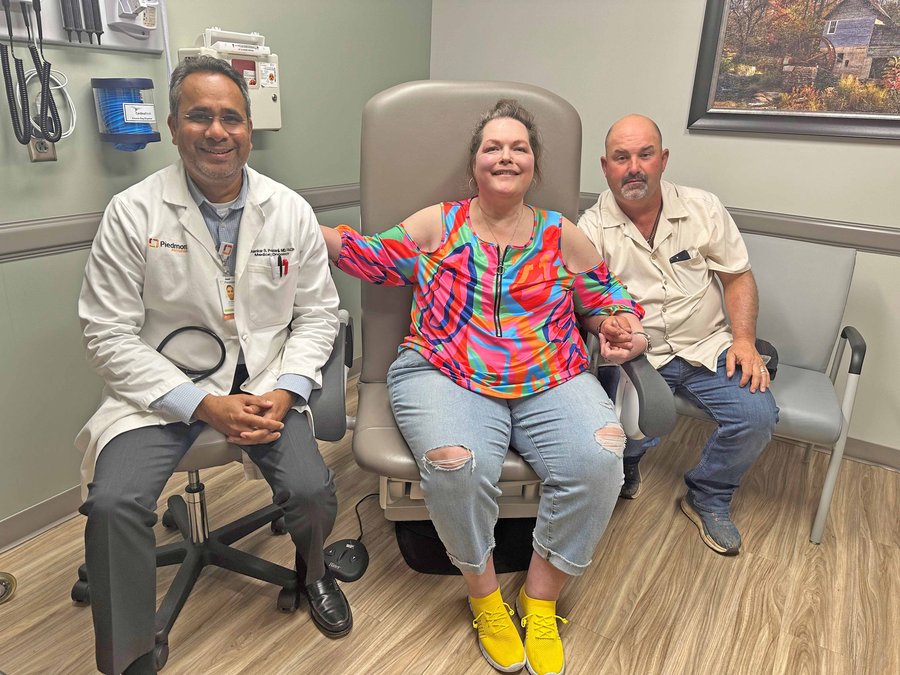Bridgett Ergle, 51, of Covington went to the emergency room for suspected pneumonia in April 2023. She did have pneumonia, but an x-ray technician also caught a lesion on her liver during the ER visit that turned out to be a metastasis from stage 4 colorectal cancer.
Ergle is part of a growing group of adults under age 55 being diagnosed with colorectal cancer. Diagnoses of people under age 55 doubled between 1995 and 2019, according to an American Cancer Society report released in March of last year. Now, about 20% of patients in the U.S. who are diagnosed with colorectal cancer are younger than 55. Screening guidelines reflect this change. For those at average risk of colorectal cancer, the American Cancer Society now recommends regular screenings start at age 45.
“I never thought about getting a colonoscopy. It didn’t even cross my mind,” Ergle said. “Now, if somebody would have said, ‘If you go and do this, it could possibly save your life or prevent this’ that might have been a different story, if people were informed like that.”
Ergle is sharing her experience to ensure more people are informed.
Ergle is not alone in Georgia in skipping screenings for colon cancer. The American Cancer Society recently reported that just 64% of eligible Georgians are screened each year, compared to the national average of 80%. The study estimates that 5,000 Georgians will be diagnosed with colon cancer in 2024. The organization’s annual report for 2024 on cancer facts and trends highlighted that colorectal cancer is now the leading cause of cancer death in men and the second in women under 50 years old.
Awareness wasn’t the only issue for Ergle, just as it may not be the only barrier for others who do not receive screenings as directed. She acknowledges that, even if she had known she was supposed to get screened, she might not have done it. She explained that fear of judgment about her weight—420 pounds at the time—had led her to avoid doctors in general before her cancer diagnosis. Ergle struggled with constipation and blood in her stool for several years before her unrelated ER visit led to finding the colorectal cancer.
“I’ll say I had no idea [about the cancer],” Ergle said. “But I was taking laxatives long before I had pneumonia because I couldn’t go to the bathroom regularly.”
The colonoscopy to confirm Ergle’s cancer revealed a 25-centimeter (or nearly 10-inch) tumor that had been causing these issues. She was taken to Piedmont Atlanta Hospital by ambulance for surgery to have an ostomy bag attached by Evan Feldman, M.D., to safely remove waste from her body. Dr. Feldman specializes in minimally-invasive, robot-assisted colon and rectal procedures.
Ergle has not asked her oncologist, Shanker Polsani, M.D., with Piedmont Physicians Medical Oncology Newton, how long she has to live—but she trusts that she is receiving the best care.
“I trust him [Dr. Polsani]. If you don’t trust your oncologist, that’s a bad thing. Because whatever he decides, it’s my life because I can’t tell you what I need. You want to get on board with somebody that you trust because he makes the decisions, he makes the calls. I’ve got to trust in him,” she said.
That trust in Polsani gave Ergle the confidence to seek her care close to home at Piedmont Newton Hospital. Her husband, Ricky, originally wanted her to go to a dedicated cancer hospital closer to Atlanta. Ergle recalls telling her husband: “I’m sick. I’m nauseous. I don’t want to be in the vehicle. If I feel like I’m not getting the care I need, then I’ll take your advice, but, honey, let’s just try Newton.” She added, “And I’m glad we did.”
Ergle says of Dr. Polsani, “He’s so caring. He listens. He cuts up with my husband. He really tries to put you at ease.”
Ergle is receiving chemotherapy weekly at the infusion center at Piedmont Newton.
“It [the infusion center at Newton] is private. It’s not the typical hospital setting. You have your massage chair, you have your own TV, there’s a chair for my husband. It’s all accommodating for you,” Ergle says about the experience.
Ergle’s tumor markers—indicators of cancer in her body—have gone down significantly since the start of her treatment.





